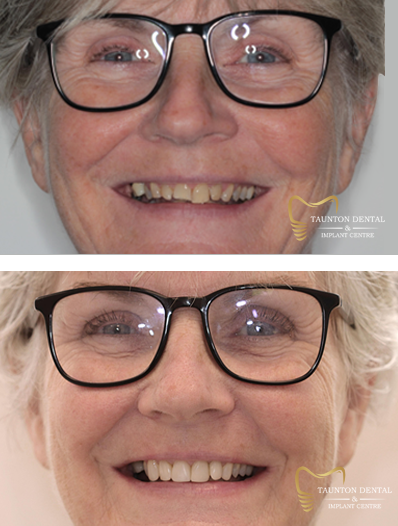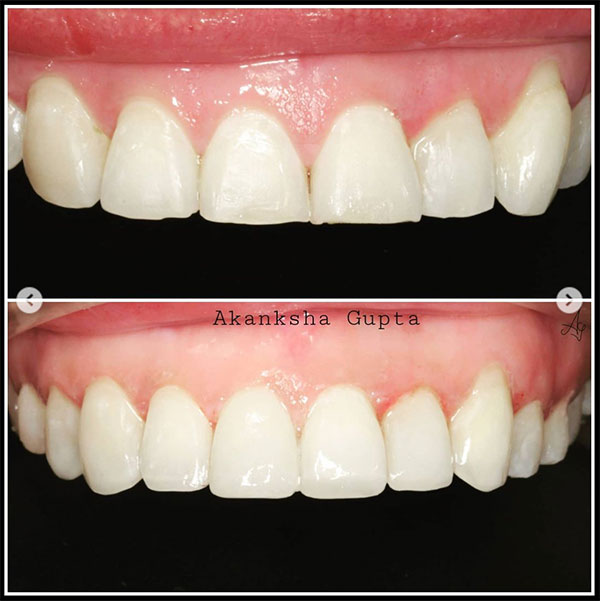Composite Bonding Dental
Composite Bonding is a perfect solution for filling chips, fractures or gaps between teeth, or for fixing discolouration. In order to bond the composite resin onto the tooth the area is roughened to help the material set and the structure of the tooth remains intact, the overall procedure is non-invasive where a part of the tooth is permanently removed. With one appointment and little downtime you can achieve that perfect smile you always wanted with some fantastic results. Composite bonding is a resin material which is attached to a tooth surface in order to restore its original appearance. The colour of the resin is matched to your teeth which means it can be used alongside teeth whitening treatments to help you achieve a brighter, whiter smile. Patient are advised to whiten their teeth first as this allows for composite to be placed in a more natural way and to achieve a more harmonious colour overall. Once the treatment has been completed patient is able to comfortably bite down by the end of the appointment.
DIRECT COMPOSITE BONDING
- Layering Technique: Involves applying composite resin in multiple layers of different shades to mimic the natural appearance of the tooth. This is done free-hand and you are unable to see the finished result before you start. No laboratory work so is more cost-effective.
- Transfer with a stent: A “mock-up” of your smile is made before-hand, for you to have a look at and approve and this is then transferred with the help of tray to replicate the exact shape you desire.
INDIRECT COMPOSITE BONDING
- Involves creating a restoration- like a veneer- outside of the mouth, usually in a dental laboratory, and then bonding it to the tooth.
- The restoration is fabricated using a mold or digital impression of the tooth, and it is then bonded to the tooth using dental adhesive.
Composite Bonding VS Porcelain or Ceramic Veneers or Crowns
Instead of Composite you can also use Porcelain or Ceramic to restore the smile back; esp if there is significant wear and loss of enamel or teeth have previously had large fillings.
Porcelain is harder wearing, very realistic looking and stain-resistant. Using latest technology, ceramic veneers can be made ultra-thin but still very strong so they are not destructive to your enamel.
In some cases, ceramic veneers are not possible as there already has been too much destruction of tooth before and crowns will be better- stronger and longer-lasting.
Composites are great as they are cost-effective and generally involve no cutting down of teeth but they do need maintenance as they can pick up stains and chip over time. This must always be factored in at the time of decision-making.
Your dentist will ultimately be best placed to advise which material is better suited for you.

Composite Bonding- a beautiful smile restored!
Our lovely patient, Liz had Boutique whitening and a few upper teeth reshaped with some protective white filling build-ups ( called Composite Bonding ).
This was all done freehand over a few appointments and with no destruction of the teeth.
It was done just in time for her son’s beautiful ,sea-side wedding, on a gorgeous summer’s day.
We are very privileged here at Taunton Dental And Implant Centre to be able to provide simple, cost-effective solutions to our patients’ journeys, so they can live their best lives!
Thankyou Liz for sharing your story!😊

Composite Bonding with good polishing looks very natural.
Instagram Profile :
https://www.instagram.com/smyle_dental? igsh=MTN0ZmNnanhkdG96aw==
Click to see how Composite Bonding can work in different scenarios- be it loss of enamel (acid erosion/attrition(grinding)/toothbrush abrasion) or to close spaces between teeth and to replace old worn, discoloured fillings.
Patient Testimonial
YOU CAN CLICK BOOK NOW or Register or
Call us on 01823 215555
FAQs
No, it's not. In most cases you won't even need a local injection.
Prices are very cost-effective compared to Porcelain or Ceramic; though bonding is not as high gloss and can chip. Also, one must account for minor repair/polishing costs after the 1st year;especially if you grind your teeth.
